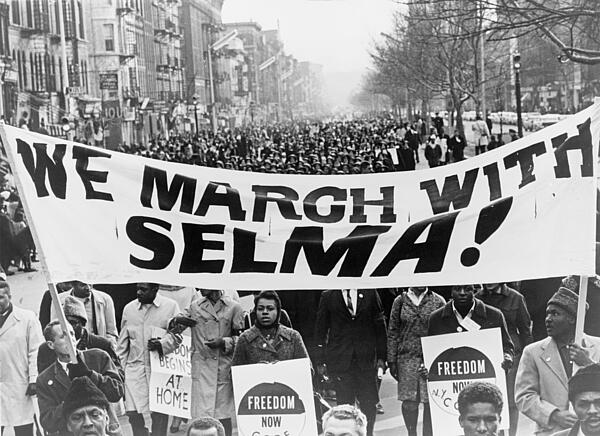Southern Christian Leadership Conference
The success of the Montgomery Bus Boycott inspired the formation of the umbrella group - The Southern Christian Leadership Conference (SCLC). Its main aim was to assist local groups in their nonviolent struggle for civil rights. On 14 February 1957, Martin Luther King was elected as president of the organisation.
The SCLC was a Christian organisation so it derived its tactics from Christian teachings. As such, its principles were as follows:
The SCLC was unique in that, as an umbrella organisation, it brought together different civil rights organisations. Rather than offer individual membership, it assisted other organisations in local protests.

The organisation was called the ‘Southern Negro Leaders Conference on Transportation and Non-violent Integration’ at first, but it soon changed its name to ‘Southern Christian Leadership Conference’ to emphasise its Christian roots.
SCLC called for three basic ‘wants’:
- That White Americans become involved in the Civil Rights Movement. They recognised that not all white Southerners were racist.
- African Americans were told they must always seek justice
- SCLC members had to adopt non-violent protest
The organisers of the SCLC decided to expand the objectives and the reach of the organisation. Leaders such a Bayard Rustin argued that local organisation was key to creating effective protest. So the SCLC aimed to coordinate, advice and develop the work done by numerous civil rights groups. It also wanted to offer workshops teaching the basics of nonviolent protest. However, the absence of direct action protest for civil rights in the South made it difficult for the SCLC to reach its full potential.
Thus, the SCLC threw themselves at assisting black Americans to register to vote. In 1958 Ella Baker helped launch the “Crusade for Citizenship”. This voter registration drive was aimed at registering two million blacks before the 1960 election. The campaign proved to be overambitious and highlighted the need for the SCLC to work with other organisations.
In 1961 the SNCC called on the SCLC and Martin Luther King to join the Albany Movement. The campaign had a major obstacle to deal with in the form of Albany Police Chief Laurie Pritchett, who had mastered the art of appearing nonviolent. The police chief preached about his use of nonviolence with a focus on mass arrests instead of mass beatings. This meant that the protest did not have the same media attention as others.
International outrage came later, in Birmingham, Alabama in 1963. The city authorities’ violent response to the demonstrations - including that of the notorious leader, Bull Connor - gained wide media coverage. Many people were shocked by the use of high pressure fire hoses and dogs to attack non-violent protesters.
A veteran of the demonstrations said: "the news media did not make the Birmingham movement powerful; it was the power of the movement that forced the press to cover it."
The SCLC also helped organise the 1963 ‘March on Washington for Jobs and Freedom’. This saw 250,000 protesters march into Washington DC on 28 August 1963.
In 1965, SCLC launched a voter registration drive and campaigned for the Voting Rights Act, which was passed in the same year. This came seven months after King launched a SCLC campaign in Selma, with the objective of pressuring Congress into action over voting rights.
This 50-mile march from Selma to Montgomery was organised by both the SNCC and the SCLC. It was not long before state troopers started attacking the marchers, which encouraged even more protesters to join the march.
After the march, SCLC focused on the poverty found in inner city ghettos with a high proportion of black inhabitants. SCLC blamed poverty for the increase in inner-city violence. With little access to good jobs, many of those who lived in the ghettos were forced to turn to crime to put food on their table. SCLC thought that the solution to this poverty was to create jobs to enable black people to climb out of poverty.
The SCLC wanted to improved housing, jobs, and better pay to improve the lives of those living in the ghettos.
The SCLC experienced a major blow when Martin Luther King was assassinated in April 1968. To many, King came to define the SCLC thanks to his global recognition and tireless work. His successor, Ralph Abernathy, was a well-respected figure in the civil rights cause, but he could never have the same status as King.
See also: 1963 Birmingham Campaign
MLA Citation/Reference
"Southern Christian Leadership Conference". HistoryLearning.com. 2026. Web.
